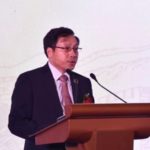Popular show sends warning to corrupt officials
General Secretary of the Communist Party of China (CPC) Central Committee Xi Jinping on Monday stressed upholding and improving the Party and state supervisory systems to ensure the Party’s line and policies are faithfully followed.
Xi made the remarks at the fourth Plenary Session of the 19th Central Commission for Discipline Inspection (CCDI) of the CPC.
Xi also stressed the importance of the fight against corruption down to the micro-level to guarantee that people’s demands for a better life are met. Anti-corruption in state-owned enterprises and for state properties should be strengthened.
Analysts noted the meeting signaled the ongoing construction of the anti-corruption system will go further and deeper this year to help the Party enhance its governance and ensure proper implementation of its policies.
The system will be further enhanced in 2020, a year the country vows to lift the entire population out of poverty and realize building a moderately prosperous society in all respects, analysts said.
Xi also said the fight against corruption will never end, and with the country’s rapid development and fast-changing society, the anti-corruption system must be continually improved.
From January to November in 2019, the CCDI investigated about 555,000 corruption cases. Some 485,000 officials were disciplined, including 42 senior officials directly managed by the CPC Central Committee. Among them, around 19,000 received prison sentences.
Some of the typical cases were shown in an anti-graft-themed program featuring details of foul acts of corrupt officials by the Chinese national broadcaster on Sunday, which showed the effectiveness and progress of the country’s reformed anti-graft system and mechanism.
The documentary-style five-episode program was jointly produced by the publicity department of the top Communist Party of China discipline watchdog and China Central Television (CCTV).
The case of Wang Xiaoguang, former vice governor of Southwest China’s Guizhou Province, who was expelled from the Party and public office in 2018, for multiple offenses, including taking bribes was shown to the public in the first episode.
Xia Xiaodong, a deputy head of the regulation office under the CCDI and the top supervisory commission, recalled how Wang tried to flush all of his expensive vintage Moutai collection in the sewer to destroy evidence. Despite this, Wang still had 4,000 such bottles in his room when the anti-graft officers arrived.
“Exposure of case details would show the public how the anti-graft work was carried out and let them better understand how forms of corruption have become increasingly complicated,” Zhuang Deshui, a deputy director of the Research Center for Government Integrity-Building at Peking University, told the Global Times on Monday.
The selection of the guilty provincial-level officials in the first episode also indicates that anti-graft efforts would continue to focus on officials who take up key public posts, and the country’s determination that it holds zero-tolerance toward corruption regardless of rank, he warned.
The successful crackdown on officials illustrates the effectiveness and authority of the reformed anti-graft system and mechanism, which will allow no ground for the corrupt, the episode said.
Zhuang hailed the country’s and Party’s reform over the matter which combines anti-graft resources at different stages, such as inspection, supervision and justice, as a huge success, marking the advancement of the system, greatly enhancing its effectiveness.
People visit the anti-corruption hall at the National Museum in Beijing. Photo: Luo Yunzhou/GT



